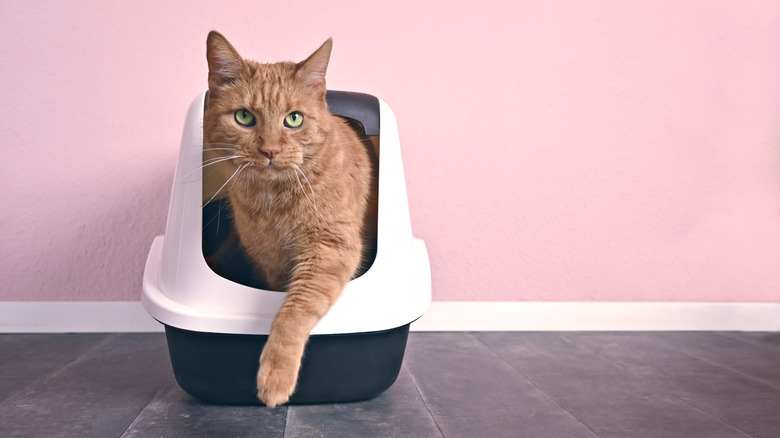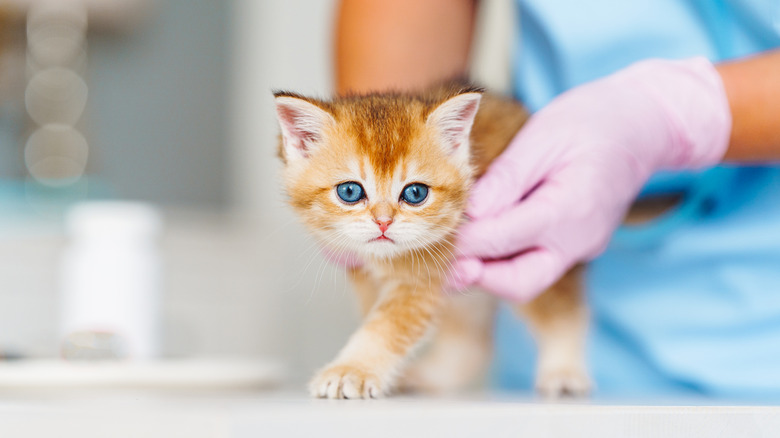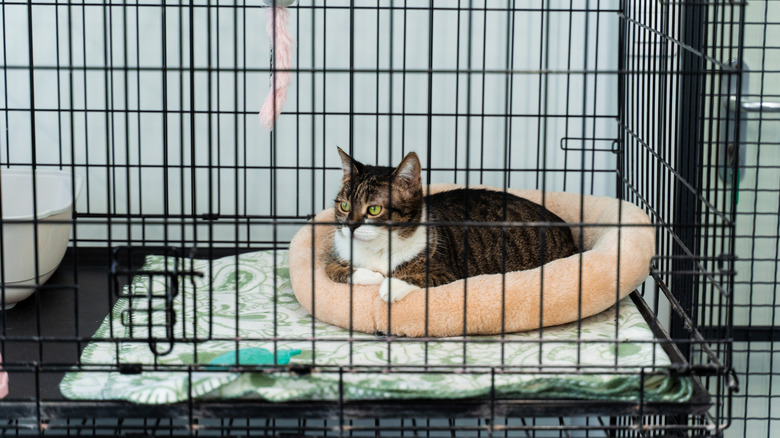The Major Differences Between Adopting A Kitten And A Cat
Ask any long-time cat owner, and they'll tell you that bringing a cat into your life can be quite the adventure. One day, you're saying "awww" as you watch it curled up in a ball, adorably covering its face as it sleeps. The next day, you're gasping in horror as it scales your curtains before the zoomies kick in, and it darts across the living room to chase the air. Cats make great companions with their quirks and warm snuggles, but it's important to weigh the pros and cons of each age group before adopting one. The differences between adopting a cat and a kitten can dictate stress level, finances, and household responsibilities in ways people don't realize.
Kittens are considered adults after 12 months, but large breeds could take twice as long to fully mature. Many adopters are drawn to kittens because they fall in love with their cute faces, high-pitched meows, and tiny paws, and they think they'll be easier to manage. Others believe adopting a kitten instead of an adult cat will create a stronger bond or give them more control in shaping the cat's personality. While there's some truth to these beliefs, adopting an adult cat could easily end up being the better choice for your lifestyle and household — with all things considered.
Kittens need more supervision than adult cats
Just like children, kittens burst with energy and love to play. They want to run, climb, scratch, jump, and explore every inch of their surroundings. At such a young age, they don't know what's safe or dangerous because they're still learning about the world around them. Kittens have been known to chew on wires, eat toxic substances, get tangled in window blind cords, and get stuck in small places. With the many risks from their mischievous nature, these tiny pets need a lot more supervision than adult pets do, either in person or via a home camera.
Adult cats can still be playful and curious, especially young adults, but their energy level tends to decrease as they age. Once a cat hits the one-year mark, it typically has a good sense of its environment and all the dos and don'ts. This means you can have more peace of mind when leaving your furry friend home alone. With a senior cat, the worry meter drops even more because chances are, it won't want to do much more than sleep.
So, if the thought of a cat running around like a maniac at night in your home, midday mischief, and potential risks don't sound like your cup of tea, a middle-aged or older cat might be a better fit for you. Cats still have plenty of character and playfulness after their first 12 months and years after, but with less chaos. It might just end up being the perfect balance of fun and mellow for your lifestyle.
Adult cats are less likely to have accidents outside the litter box than kittens
Kittens typically learn how to eliminate in a litter box from their mother, assuming she used one herself, or they use it instinctively. However, just like toddlers and young children, they may have accidents for one reason or another. Kittens lack the ability to control their bladder and bowel movements as well as adult cats. This could cause them to leave their owners an unexpected cleanup within a few feet of their litter box.
On the other hand, some kittens are born in a place without access to a litter box, or their mother becomes separated from them shortly after their birth. Others might have been taught to use pee pads, newspaper, or something else instead. These felines require training from a human to help them learn the preferred place to urinate and defecate, so they're likely to have accidents during this time.
Adult cats, in comparison, are usually well-versed in litter box behavior. Most know exactly where to go and how to cover their waste, making life easier for their humans. While occasional accidents can happen with a cat of any age, due to medical issues, stress, or a dirty litter box, they're more common with kittens. Of course, there's always a possibility you'll get lucky and adopt a kitten that's never had an accident. But if you'd rather not take any chances, aim for an older feline.
Kittens generally cost more than adult cats
If you're a responsible, caring pet owner, you're likely to spend at least hundreds of dollars every year on food, toys, bedding, treats, vaccines, boarding, grooming, and annual wellness exams. While pet insurance can save you money on certain expenses, you'll still end up paying over $100 a year on the monthly payments. One factor that can dramatically affect costs is the age of the pet. Owning a kitten could cost you much more than a healthy adult cat, especially if you adopt it between 6 and 16 weeks of age.
Veterinarians strongly suggest the administration of certain core and non-core vaccines for kittens during their first 4 months of life. This means you'll need to make multiple visits to the vet for this initial vaccination series within those months. Spaying or neutering is another expense. These procedures are also encouraged by many animal experts, and the best time to have them done for a kitten is around 5 months of age.
Adult cats over 1 year old should be vaccinated annually or every three years, depending on the vaccine and your cat's lifestyle. Assuming the adult cat you adopt is already current on its vaccines and has no underlying health conditions, you'll only have to worry about the annual expense to update them, if not less frequently. In terms of sterilization, adult cats are more likely to be spayed/neutered than kittens, so this is another expense you may not have to worry about.
Adult shelter cats have a higher risk of being euthanized than kittens
In a perfect world, no animal would have to be euthanized, but sadly, this happens every day at a shelter somewhere in the world. Sometimes, it's due to overcrowding, low staffing, or medical issues. Other times, it's due to age. A 2018 study in Animals noted that historically, a higher percentage of adult cats are euthanized in animal shelters compared to kittens, as they are less likely to be adopted.
With this data in mind, you could be the hero who saves a life by adopting an adult cat, especially if you adopt from an open-admission shelter. It's important to note that even no-kill shelters sometimes have to euthanize pets. Plus, choosing a cat that spent two years at a shelter can be more rewarding than opting for the adorable kitten that was born just two months ago. Sadly, some cats spend much longer than two years in a kennel before being adopted, but others live out the rest of their days in a shelter.
Ultimately, the choice to adopt a kitten, adult cat, or senior cat is entirely up to you and no one else. Each age group comes with its own set of benefits and challenges, so it's certainly possible to have a wonderful experience with a cat of any age. That said, taking time to consider the pros and cons of each can help you make the best decision for you and your family.




